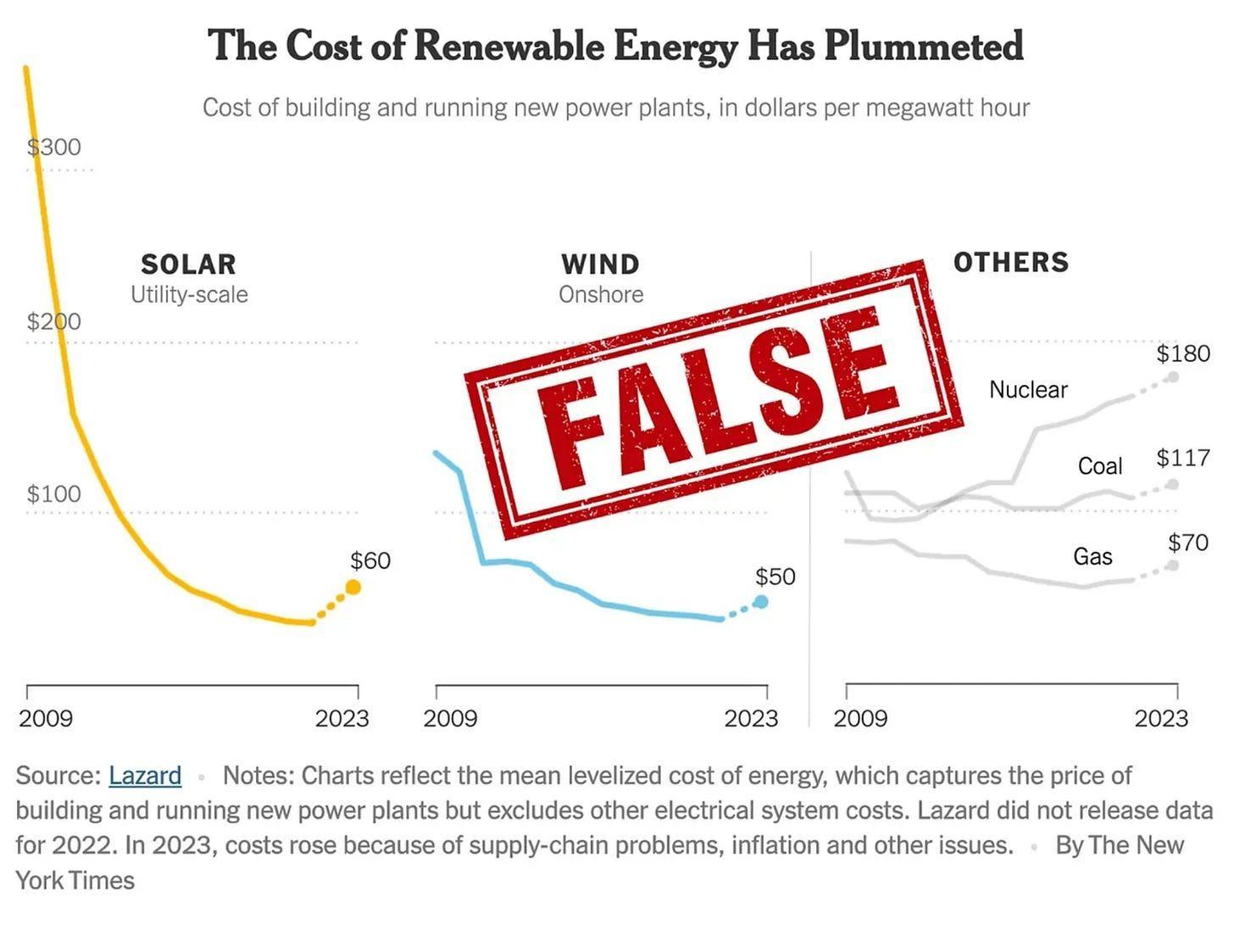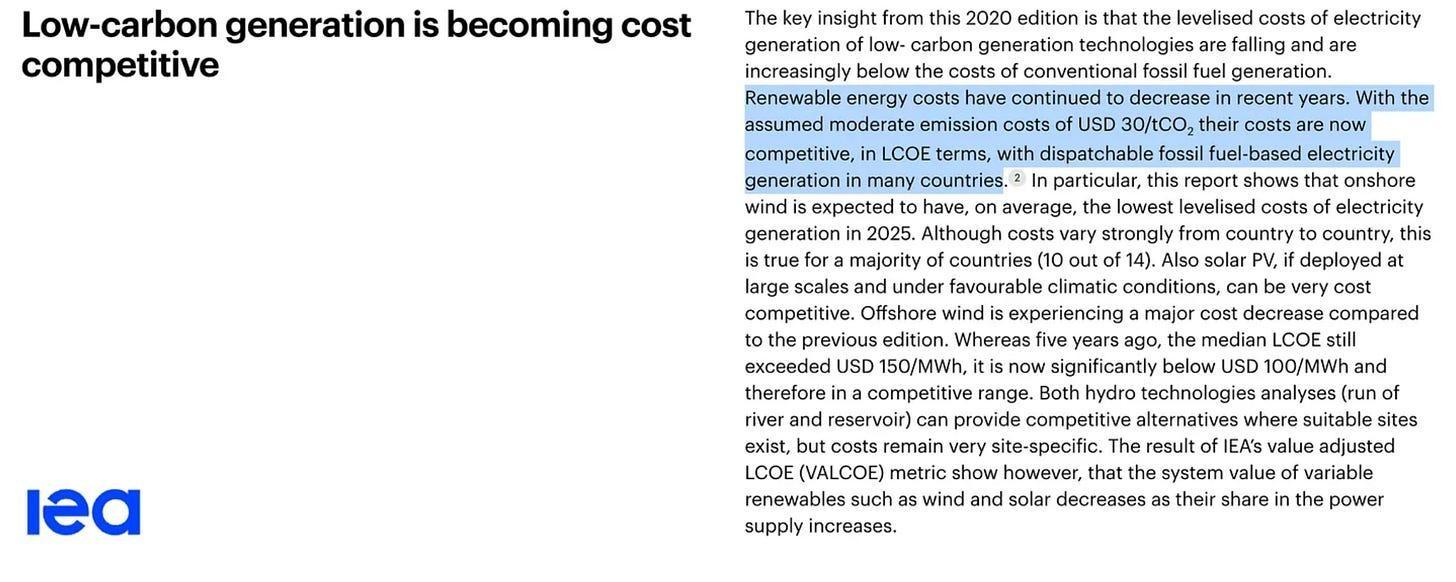Link: https://alexepstein.substack.com/p/the-levelized-cost-of-energyscam/
Please see the link above for the source text.
Energy Talking Points by Alex
The "Levelized Cost of Energy" scam
LCOE—the "Levelized Cost of Energy"—explicitly ignores "reliabilityrelated considerations" and is therefore a garbage metric for comparing the cost of different types of electricity.
Alex Epstein
Oct 01, 2025
LCOE must die.
If you ever hear anyone favorably compare solar and wind to coal, gas, or nuclear by citing a low LCOE—“Levelized Cost of Energy”—you are being scammed.
LCOE explicitly ignores “reliability-related considerations” and is therefore a garbage metric.1

”LCOE” is constantly cited to claim that solar and wind are “cheaper” than fossil fuels
● You’ve heard it over and over: “Solar and wind are now cheaper than fossil fuels.”
You might suspect something is wrong here, because if solar and wind were so cheap their developers wouldn’t always be asking for subsidies, or claim the sky is falling when subsidies are taken away.2
●
● The suspicious claim that “Solar and wind are now cheaper than fossil fuels” is usually justified using an
intimidating-sounding metric called LCOE: “Levelized Cost of Energy.”
LCOE is used all the time in prestigious publications and in government.
● In a 2020 report, the International Energy Agency used LCOE to claim that “renewable” energy costs are now “competitive” with fossil fuel costs, and that onshore wind is the cheapest source of electricity in most countries.3 ●

● In a 2023 article titled “The Clean Energy Future Is Arriving Faster Than You Think,” the New York Times used LCOE to claim that solar and wind are somehow cheap while coal, gas, and nuclear are somehow expensive.
●
● When you hear that the LCOE (”Levelized Cost of Energy”) of solar and wind is cheaper than that of natural gas or coal or nuclear—and yet solar and wind somehow still need massive subsidies—don’t be intimidated into abandoning your skepticism.
LCOE is an easily-debunked scam.
LCOE absurdly equates the value of reliable electricity and unreliable electricity
● Imagine there were a metric called LCOB—Levelized Cost of Babysitters—that compared the cost of different babysitters in your neighborhood.
But there was a catch that made it useless: the organization collecting the metric allowed totally unreliable babysitters to qualify.
● Imagine that unreliable babysitters sold themselves by saying: We have the cheapest LCOB—we only charge $15/hour, while reliable ones charge $20.
Obviously that would be a scam because in practice if you pay for an unreliable babysitter you also need to pay for a reliable one.
● Whether you’re comparing babysitters or sources of electricity, reliability is table stakes.
And yet LCOE—Levelized Cost of Electricity—popularized by the firm Lazard, explicitly excludes “reliabilityrelated considerations”!4
●
● Part of LCOE is reasonable: it compares different electricity sources by adding up the sources’ full lifetime costs and dividing this by output.
This would work well to compare sources’ efficiency—if the sources in question are all required to be reliable.
But LCOE doesn’t.
● By allowing unreliable electricity to qualify as “electricity” or “energy,” LCOE wildly understates the cost of solar and wind. In reality, solar and wind need life support from reliable sources.
The cost of using them is the full system cost, including life support cost.
● The full life-support cost of solar and wind includes the dispatchable power plants that accommodate solar and wind’s unreliability—and the high-density long-distance transmission wires needed to connect faraway solar and wind to nearby grids— and various grid-stabilizing expenses.
● Solar and wind’s life-support costs are large and increase with the percentage of solar and wind use.
At 10%, they can be somewhat affordable. But at 50+% there are huge new costs for transmission, grid-stabilizing, storage, and overbuilding (to maximize solar and wind even during bad weather).
LCOE should be expunged from all energy discussions and energy policymaking
● So long as LCOE treats unreliable and reliable electricity sources as equal, it is a trash metric that should not be utilized to compare energy sources.
And since it is widely utilized it needs to be deliberately expunged from honest discussions and from policymaking.
● Current government or government-related groups that use LCOE and should stop are The International Energy Agency, the US Energy Information Agency, the European Commission.
Ditto for major media sources: The New York Times, The Wall Street Journal, CBS, ABC, etc.
● What should replace LCOE?
Above all an understanding that you can’t compare the costs of unreliable and reliable electricity—and that unreliable electricity becomes more expensive at larger scales.
Any cost discussion of solar and wind must account for their full, escalating costs.
● If we reject LCOE and actually value reliability in cost calculations, it will reveal the common-sense reality that it’s not “cheap” to try to power the grid overwhelmingly with unreliable sources.
Popular links
● EnergyTalkingPoints.com: Hundreds of concise, powerful, wellreferenced talking points on energy, environmental, and climate issues.
● My new book Fossil Future: Why Global Human Flourishing Requires More Oil, Coal, and Natural Gas—Not Less.
● Speaking and media inquiries
“Energy Talking Points by Alex Epstein” is my free Substack newsletter designed to give as many people as possible access to concise, powerful, well-referenced talking points on the latest energy, environmental, and climate issues from a pro-human, pro-energy perspective.
